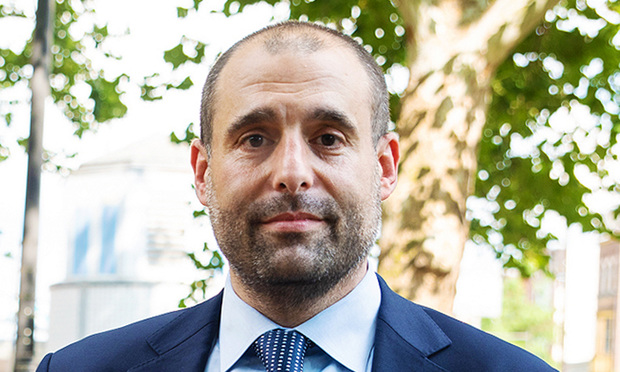Superior Court Holds Possible Exception to Warrant of Attorney Rule
As the COVID-19 pandemic continues to take its toll on businesses in Pennsylvania and beyond, now is a good opportunity to discuss one of the most oppressive tools that commercial lenders have in their arsenal for defaulting borrowers—a warrant of attorney.
July 22, 2020 at 10:30 AM
7 minute read
 Alan Nochumson of Nochumson P.C.
Alan Nochumson of Nochumson P.C.
As the COVID-19 pandemic continues to take its toll on businesses in Pennsylvania and beyond, now is a good opportunity to discuss one of the most oppressive tools that commercial lenders have in their arsenal for defaulting borrowers—a warrant of attorney, which is a contractual provision that allows such lenders the ability to enter a judgment of record against their tenants, borrowers and guarantors, as the case may be, by simply filing a complaint alleging a default under the written lease or loan documents and then demanding a confessed judgment of an amount certain.
In Pennsylvania, the general rule is that "a warrant of attorney to confess judgment may not be exercised twice for the same debt."
However, in a recent decision, SDO Fund II D32 v. Donahue, 2020 Pa. LEXIS 492 (June 17, 2020) the Superior Court of Pennsylvania recently held that there may be an exception to that "black letter" rule.
In 2008, Gerard T. Donahue, president of 417 Lackawanna LLC, entered into a written guaranty agreement with PNC Bank N.A., rendering Donahue a guarantor and surety on account of a commercial real estate loan in the amount of $5.4 million extended to 417 Lackawanna by PNC, the opinion said.
The guaranty agreement contained a warrant of attorney that authorized PNC to confess judgment for the total amount due, upon an event of default, and that provided that "no single exercise" of the warrant, "or a series of judgments," would exhaust the warrant of attorney, the opinion said.
Over the course of several years, Donahue, acting in his capacity as president of 417 Lackawanna as well as the guarantor, executed a series of amendments to the loan documents, the opinion said.
The amendments to the loan documents each contained a warrant of attorney authorizing the confession of judgment not only against 417 Lackawanna, as principal, but also against Donahue, as guarantor, and permitted the entry of multiple successive judgments until the debt was paid in full, the opinion said.
At one point during this period of time, PNC actually confessed judgment against Donohue under the loan documents but did not execute upon the confessed judgment and instead amicably resolved the dispute by instead amending the obligations of 417 Lackawanna under the loan documents with his permission as the guarantor, the opinion said.
According to the opinion, on each occasion, Donahue, as guarantor, also executed a separate document in which he "ratifie[d] and confirm[ed]" the confession of judgment provision contained in the guaranty.
PNC ultimately assigned the loan documents to SDO Fund II D32, the opinion said.
When 417 Lackawanna defaulted on the loan, the parties entered into a written forbearance agreement, which contained a warrant of attorney authorizing the confession of judgment against 417 Lackawanna, including the entry of "a series of judgments," until the debt was paid in full, the opinion said.
Donahue again executed in his personal capacity as guarantor a separate document in which he again "ratifie[d] and confirm[ed]" the warrant of attorney contained in the guaranty agreement, the opinion said.
Upon the debt remaining unsatisfied, as per the forbearance agreement and a subsequently entered into amendment to the forbearance agreement, SDO filed a complaint in confession of judgment and entered a confessed judgment in the amount of $5,689,780.41 against Donahue.
Donahue then filed a petition seeking to strike and, in the alternative, to open the monetary judgment against him.
After the trial court denied the petition, Donahue then appealed the trial court's ruling to the Superior Court.
On appeal, Donahue argued that a judgment may be confessed only once for the same debt and the law precludes repeated exercises of a warrant of attorney to confess judgment and that, since PNC had previously confessed judgment against him on the same debt, the warrant of attorney contained in the guaranty agreement had been exhausted when PNC exercised it against him, such that SDO could not use the warrant of attorney.
Additionally, Donahue pointed out that, when he consented as guarantor to the amendments to the loan documents by way of a separate document, none of these documents contained a new warranty of attorney, but rather merely stated that the warrant of attorney contained in the guaranty agreement was being "ratified" and "confirmed," but those words "ratify" and "confirm" did not have the effect of revitalizing the previously exhausted warrant of attorney.
In response, SDO contended that parties could waive the general rule by agreement and permit multiple exercises of a warrant of attorney for the same debt and that the guaranty agreement plainly permitted multiple exercises of the warrant of attorney.
SDO further stated that Donahue submitted himself to new warrants of attorney in several of the amendments to the loan documents.
The Superior Court denied the appeal.
Although the Superior Court agreed that the 'general rule' in Pennsylvania is that a warrant of attorney to confess judgment may not be exercised twice for the same debt, it cited to its previous decision in the case of Dime Bank v. Andrews, 115 A.3d 358 (Pa. Super. Ct. 2015) for the proposition that "under certain circumstances, and to certain extents, parties to a note may waive this rule, allowing for multiple exercises of a warrant of authority to confess judgment."
In reaching its conclusion, the Superior Court noted that a warrant of attorney is a contractual agreement and the parties to the contract are free to determine the extent of the power the warrant confers, including the number of times the holder of the warrant may exercise it.
As such, the Superior Court agreed with SDO that parties were free to waive the general rule by contract.
The Superior Court held that the plain language of the guaranty agreement empowered SDO to confess judgment against Donahue as many times as necessary until it received payment in full.
The Superior Court also noted that Donahue thereafter executed multiple agreements that ratified and confirmed the warrant of attorney contained in the guaranty agreement.
According to the Superior Court, the parties, through their own contracts, mutually agreed to allow for multiple exercises of the warrant of attorney to confess judgment. As such, the Superior Court ruled that the first confession of judgment by PNC had not exhausted the warrant of attorney.
As the trial court had determined that Donahue had submitted himself to separate warrants of attorney in several amendments to the loan documents, each of which authorized SDO to confess judgment against him for the default under the guaranty agreement, the Superior Court found no abuse of discretion by the trial court in denying Donahue's petition.
Alan Nochumson is the sole shareholder of Nochumson P.C., where his law firm's primary practice areas consist of real estate, litigation, land use and zoning, business formation and general counseling and appellate advocacy. He is also president of Bear Abstract Services, where his title insurance company offers comprehensive title insurance, title examination and closing services. He can be reached at 215-399-1346 or [email protected].
This content has been archived. It is available through our partners, LexisNexis® and Bloomberg Law.
To view this content, please continue to their sites.
Not a Lexis Subscriber?
Subscribe Now
Not a Bloomberg Law Subscriber?
Subscribe Now
NOT FOR REPRINT
© 2025 ALM Global, LLC, All Rights Reserved. Request academic re-use from www.copyright.com. All other uses, submit a request to [email protected]. For more information visit Asset & Logo Licensing.
You Might Like
View All
K&L Gates Sheds Space, but Will Stay in Flagship Pittsburgh Office After Lease Renewal

Commonwealth Court Overturns Award of Damages Assessed Against Landlord on Claims of Unlawful Discrimination
6 minute read

Wholesale Real Estate Transaction Transparency and Protection Act Takes Effect Jan. 4: What You Need to Know
Trending Stories
- 1Courts Grapple With The Corporate Transparency Act
- 2FTC Chair Lina Khan Sues John Deere Over 'Right to Repair,' Infuriates Successor
- 3‘Facebook’s Descent Into Toxic Masculinity’ Prompts Stanford Professor to Drop Meta as Client
- 4Pa. Superior Court: Sorority's Interview Notes Not Shielded From Discovery in Lawsuit Over Student's Death
- 5Kraken’s Chief Legal Officer Exits, Eyes Role in Trump Administration
Who Got The Work
J. Brugh Lower of Gibbons has entered an appearance for industrial equipment supplier Devco Corporation in a pending trademark infringement lawsuit. The suit, accusing the defendant of selling knock-off Graco products, was filed Dec. 18 in New Jersey District Court by Rivkin Radler on behalf of Graco Inc. and Graco Minnesota. The case, assigned to U.S. District Judge Zahid N. Quraishi, is 3:24-cv-11294, Graco Inc. et al v. Devco Corporation.
Who Got The Work
Rebecca Maller-Stein and Kent A. Yalowitz of Arnold & Porter Kaye Scholer have entered their appearances for Hanaco Venture Capital and its executives, Lior Prosor and David Frankel, in a pending securities lawsuit. The action, filed on Dec. 24 in New York Southern District Court by Zell, Aron & Co. on behalf of Goldeneye Advisors, accuses the defendants of negligently and fraudulently managing the plaintiff's $1 million investment. The case, assigned to U.S. District Judge Vernon S. Broderick, is 1:24-cv-09918, Goldeneye Advisors, LLC v. Hanaco Venture Capital, Ltd. et al.
Who Got The Work
Attorneys from A&O Shearman has stepped in as defense counsel for Toronto-Dominion Bank and other defendants in a pending securities class action. The suit, filed Dec. 11 in New York Southern District Court by Bleichmar Fonti & Auld, accuses the defendants of concealing the bank's 'pervasive' deficiencies in regards to its compliance with the Bank Secrecy Act and the quality of its anti-money laundering controls. The case, assigned to U.S. District Judge Arun Subramanian, is 1:24-cv-09445, Gonzalez v. The Toronto-Dominion Bank et al.
Who Got The Work
Crown Castle International, a Pennsylvania company providing shared communications infrastructure, has turned to Luke D. Wolf of Gordon Rees Scully Mansukhani to fend off a pending breach-of-contract lawsuit. The court action, filed Nov. 25 in Michigan Eastern District Court by Hooper Hathaway PC on behalf of The Town Residences LLC, accuses Crown Castle of failing to transfer approximately $30,000 in utility payments from T-Mobile in breach of a roof-top lease and assignment agreement. The case, assigned to U.S. District Judge Susan K. Declercq, is 2:24-cv-13131, The Town Residences LLC v. T-Mobile US, Inc. et al.
Who Got The Work
Wilfred P. Coronato and Daniel M. Schwartz of McCarter & English have stepped in as defense counsel to Electrolux Home Products Inc. in a pending product liability lawsuit. The court action, filed Nov. 26 in New York Eastern District Court by Poulos Lopiccolo PC and Nagel Rice LLP on behalf of David Stern, alleges that the defendant's refrigerators’ drawers and shelving repeatedly break and fall apart within months after purchase. The case, assigned to U.S. District Judge Joan M. Azrack, is 2:24-cv-08204, Stern v. Electrolux Home Products, Inc.
Featured Firms
Law Offices of Gary Martin Hays & Associates, P.C.
(470) 294-1674
Law Offices of Mark E. Salomone
(857) 444-6468
Smith & Hassler
(713) 739-1250





